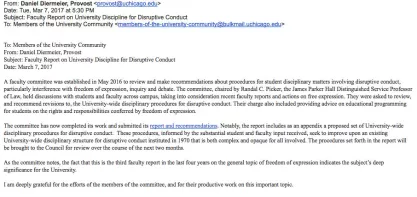Table of Contents
In wake of Middlebury incident, speech-friendly UChicago releases promising ‘Disruptive Conduct’ report

Just days after violent protests over a speech by writer and academic Charles Murray roiled Middlebury College in Vermont and left FIRE openly wondering if we were witnessing “the death of liberty on campus,” an announcement from the University of Chicago suggests hope on the horizon.
In an email to the university community late yesterday, UChicago Provost Daniel Diermeier announced that a committee formed last year to “review and make recommendations about procedures for student disciplinary matters involving disruptive conduct including interference with freedom of inquiry or debate” had completed its work and released its report.

News of UChicago’s freshly-completed Report of the Committee on University Discipline for Disruptive Conduct comes less than a week after the Middlebury incident, in which Murray’s speech was shouted down and a professor-moderator suffered a neck injury in the ensuing melee. Middlebury President Laurie L. Patton released a statement the following day promising a response “in the very near future to the clear violations of Middlebury College policy that occurred.”
FIRE has long praised UChicago for its path-breaking efforts to protect speech on its campus before these kinds of incidents occur, including its formulation and adoption of the “Chicago Statement.” FIRE has endorsed and promoted the Chicago Statement as the gold standard for campus free speech policy statements, and faculty and administrative bodies at other institutions nationwide continue to adapt and adopt it.
The new UChicago report cites two guiding, speech-protective principles gleaned from the Chicago Statement and a 2014 report on protest and dissent: First, that “the University’s fundamental commitment is to the principle that debate or deliberation may not be suppressed because the ideas put forth are thought by some or even by most members of the University community to be offensive, unwise, immoral, or wrong-headed,” and second, that “[d]issent and protest should be affirmatively welcomed, not merely tolerated, by the University.”
Among the promising recommendations are an update to the university’s definition of “disruptive conduct” and a reworking of school policies and event management procedures — both of which would reduce the likelihood that people engaged in disruptive conduct could prevent speakers from speaking or being heard.
The committee also recommends “a more robust program of educational programming to ensure that students understand the rights and responsibilities of participating in the free-speech commons at the University,” as well as education for on-call deans who would typically be tasked with responding in real time to disruptive speech incidents.
FIRE will continue to monitor the implementation of these recommendations at UChicago. In the meantime, we urge other colleges and universities to undertake a similarly thoughtful review of their own speech-related policies and procedures and make changes to ensure debate is protected on their respective campuses.
As always, FIRE is here to help guide any institution to achieve that goal.
Recent Articles
FIRE’s award-winning Newsdesk covers the free speech news you need to stay informed.

FIRE to SCOTUS: TikTok ban violates Americans' First Amendment rights

California and other states are rushing to regulate AI. This is what they’re missing

One day after FIRE lawsuit, Congress passes changes to filming permits in national parks
